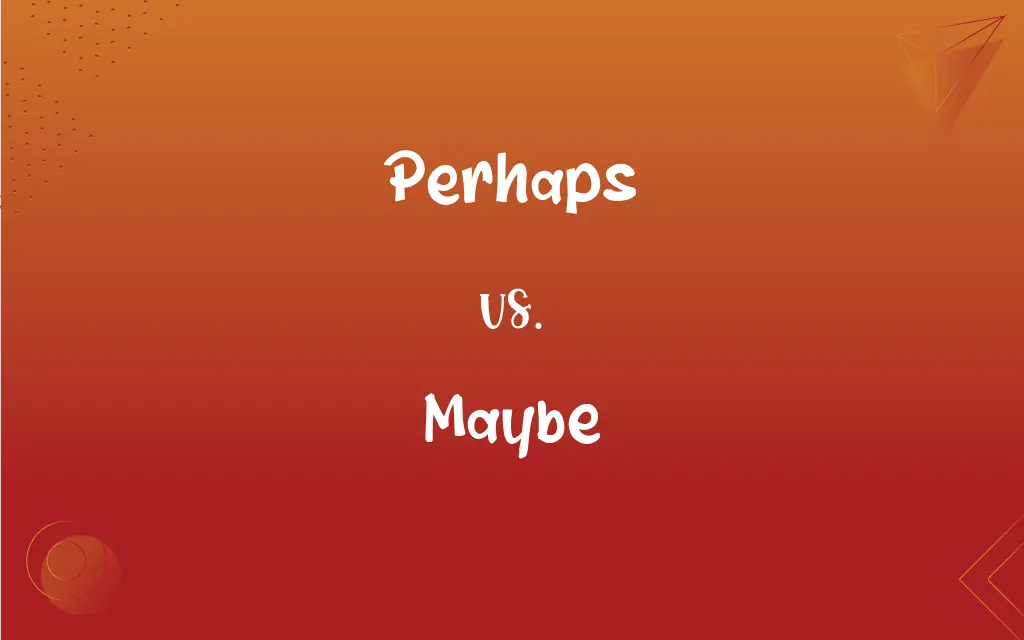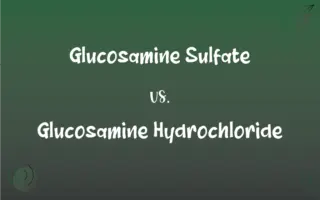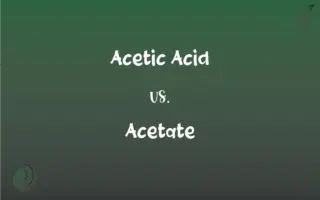Perhaps vs. Maybe: What's the Difference?
Edited by Aimie Carlson || By Janet White || Published on December 16, 2023
"Perhaps" suggests a more formal or tentative possibility, while "maybe" is more informal and commonly used in everyday speech to indicate uncertainty or possibility.

Key Differences
"Perhaps" carries a tone of formality and is often used in written or formal spoken English. It implies a cautious or considered speculation. Conversely, "maybe" is more colloquial and frequently appears in casual conversation, reflecting a more spontaneous or informal speculation.
In usage, "perhaps" often introduces a suggestion or a polite request, adding a sense of politeness or deference. "Maybe", on the other hand, is straightforward and is typically used to express a simple uncertainty or indecision without the nuances of politeness or formality.
The origins of the words also differ. "Perhaps" is derived from the phrase "per haps" (by chance), indicating a possibility dependent on uncertain conditions. "Maybe" is a compound of "may" and "be", directly suggesting something that might be or come to pass.
In literature, "perhaps" is often used to create a mood of ambiguity or to suggest a deeper level of contemplation. "Maybe", in contrast, is used to convey a more direct, straightforward sense of uncertainty or potential.
In summary, while both "perhaps" and "maybe" denote a sense of uncertainty, they differ in their level of formality, the context of their usage, their etymology, and their stylistic connotations in various forms of communication.
ADVERTISEMENT
Comparison Chart
Formality Level
Formal
Informal
Usage Context
Written and formal speech
Casual conversation
Tone
Polite, cautious
Direct, straightforward
Origin
From "per haps" (by chance)
Compound of "may" and "be"
Literary Use
Ambiguity, contemplation
Direct uncertainty
ADVERTISEMENT
Perhaps and Maybe Definitions
Perhaps
Indicating Uncertainty.
Perhaps it will rain tomorrow.
Maybe
Pondering.
Maybe he knows the answer.
Perhaps
Suggesting a Possibility.
Perhaps you could try calling her.
Maybe
Expressing Uncertainty.
Maybe it will rain tomorrow.
Perhaps
Introducing a Hypothesis.
Perhaps the key is under the mat.
Maybe
Speculating.
Maybe the key is under the mat.
Perhaps
Polite Suggestion.
Perhaps we should leave now.
Maybe
Considering a Possibility.
Maybe you could try calling her.
Perhaps
Speculating.
Perhaps he knows the answer.
Maybe
Indicating Indecision.
Maybe we should leave now.
Perhaps
Maybe; possibly.
Maybe
Used to indicate uncertainty or possibility
We should maybe take a different route. Maybe it won't rain.
Perhaps
Modifies a verb, indicating a lack of certainty.
Perhaps John will come over for dinner.
Maybe
An uncertainty
There are so many maybes involved in playing the stock market.
Perhaps
(rare) By chance.
Maybe
An uncertain reply
It's better to receive a fast and honest no than a drawn-out maybe.
Perhaps
An uncertainty.
Maybe
Modifies a verb, indicating a lack of certainty: it may be (that)...
Maybe I was imagining it, but I could swear that the dog understood what I was saying.
Perhaps
By chance; peradventure; perchance; it may be.
And pray God, if perhaps the thought of thine heart may be forgiven thee.
Maybe
Perhaps that is true expressing no commitment to a decision or a neutral viewpoint to a statement.
Perhaps
By chance;
Perhaps she will call tomorrow
We may possibly run into them at the concert
It may peradventure be thought that there never was such a time
Maybe
Certainly.
Maybe not the best idea.
Maybe
Possible; uncertain.
Maybe
(informal) Something that is possibly true.
Maybe
(informal) An answer that shows neither agreement nor disagreement.
The results of the poll were inconclusive. We got two yeses, three nos, and four maybes.
Maybe
(informal) A future event that may or may not happen.
About your raise: it's a big maybe.
Maybe
Perhaps; possibly; peradventure.
Maybe the amorous count solicits her.
In a liberal and, maybe, somewhat reckless way.
Maybe
Possible; probable, but not sure.
Then add those maybe years thou hast to live.
Maybe
Possibility; uncertainty.
What they offer is mere maybe and shift.
Maybe
By chance;
Perhaps she will call tomorrow
We may possibly run into them at the concert
It may peradventure be thought that there never was such a time
FAQs
Can I use "maybe" in a formal presentation?
It's better to use "perhaps" in formal settings.
Do "perhaps" and "maybe" mean the same?
Essentially, yes, but they differ in formality and usage context.
Can "maybe" be used in formal writing?
It's less common, but "maybe" can be used in less formal writing.
Is "perhaps" more formal than "maybe"?
Yes, "perhaps" is generally more formal.
Is "perhaps" used in everyday conversation?
It can be, but "maybe" is more common in casual speech.
Do "perhaps" and "maybe" have different origins?
Yes, "perhaps" comes from "per haps", and "maybe" from "may be".
Is "maybe" a modern word?
"Maybe" has been in use for several centuries, but it's more modern than "perhaps".
Are there situations where "perhaps" is preferred over "maybe"?
In formal writing and when making polite suggestions, "perhaps" is preferred.
Is "perhaps" British English?
"Perhaps" is used in both British and American English.
Does "maybe" sound less sure than "perhaps"?
No, they both express a similar level of uncertainty.
Can "maybe" imply a higher probability than "perhaps"?
No, both words imply similar levels of probability.
Can "perhaps" indicate a polite suggestion?
Yes, it's often used to softly suggest or propose something.
Is "perhaps" more polite than "maybe"?
Yes, it's often perceived as more polite or tentative.
Can "maybe" be used to express speculation?
Yes, it's commonly used to speculate about possibilities.
Can "maybe" be used to introduce a hypothesis?
Yes, it can introduce a hypothesis, especially in informal contexts.
Can "maybe" be used in academic writing?
It's less formal, so it's typically avoided in academic writing.
Is "perhaps" more likely to be used in literature?
Yes, especially in contexts requiring nuance and subtlety.
Is "perhaps" outdated?
Not necessarily, but its use is more formal and less common in everyday speech.
Is "perhaps" used in legal documents?
Rarely, as legal language typically avoids ambiguous terms.
Does "maybe" imply a casual tone?
Yes, it's typically used in a more casual and direct manner.
About Author
Written by
Janet WhiteJanet White has been an esteemed writer and blogger for Difference Wiki. Holding a Master's degree in Science and Medical Journalism from the prestigious Boston University, she has consistently demonstrated her expertise and passion for her field. When she's not immersed in her work, Janet relishes her time exercising, delving into a good book, and cherishing moments with friends and family.
Edited by
Aimie CarlsonAimie Carlson, holding a master's degree in English literature, is a fervent English language enthusiast. She lends her writing talents to Difference Wiki, a prominent website that specializes in comparisons, offering readers insightful analyses that both captivate and inform.






































































